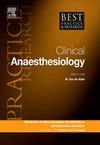The role of biomarkers in the preoperative evaluation of cardiac surgical patients – A narrative review
IF 2.8
3区 医学
Q1 ANESTHESIOLOGY
Best Practice & Research-Clinical Anaesthesiology
Pub Date : 2025-06-01
DOI:10.1016/j.bpa.2025.09.002
引用次数: 0
Abstract
Background
Biomarkers play a crucial role in the preoperative assessment for cardiac surgery, aiding in risk stratification and evaluating comorbid diseases.
Objective
This narrative review summarizes current evidence on preoperative biomarkers in cardiac surgery and their role for risk stratification in international guidelines.
Methods
A review of relevant literature was conducted to assess the prognostic value of various biomarkers, including their integration into established risk scoring systems.
Results
Among cardiac biomarkers, brain natriuretic peptide (BNP) has been found to independently predict outcomes and may enhance prognostic accuracy when combined with scoring systems such as the Society of Thoracic Surgeons (STS) and Euroscore calculators. Additionally, several biomarkers related to comorbid diseases demonstrate independent associations with postoperative outcomes, some of which are already included in these scoring systems. Biomarkers such as glycosylated haemoglobin, C-reactive protein (CRP), and albumin levels are strongly linked to surgical outcomes and may aid perioperative optimization. Emerging evidence suggests that novel biomarkers, including inflammatory cytokines, may provide predictive value for specific complications.
Conclusion
Biomarkers are an essential component of preoperative assessment and risk stratification in cardiac surgery. Further research is needed to refine biomarker-based predictive models to enhance postoperative morbidity and mortality risk assessment.
生物标志物在心脏手术患者术前评估中的作用——综述
生物标志物在心脏手术术前评估中起着至关重要的作用,有助于风险分层和评估合并症。目的本综述总结了心脏手术术前生物标志物的最新证据及其在国际指南中风险分层中的作用。方法回顾相关文献,评估各种生物标志物的预后价值,包括将其整合到已建立的风险评分系统中。在心脏生物标志物中,已发现脑钠肽(BNP)可独立预测预后,并可与评分系统(如胸外科学会(STS)和欧洲评分计算器)联合使用时提高预后准确性。此外,一些与合并症相关的生物标志物显示出与术后结果的独立关联,其中一些已被纳入这些评分系统。生物标志物如糖化血红蛋白、c反应蛋白(CRP)和白蛋白水平与手术结果密切相关,并可能有助于围手术期优化。新出现的证据表明,新的生物标志物,包括炎症细胞因子,可能为特定并发症提供预测价值。结论生物标志物是心脏手术术前评估和风险分层的重要组成部分。需要进一步的研究来完善基于生物标志物的预测模型,以提高术后发病率和死亡率的风险评估。
本文章由计算机程序翻译,如有差异,请以英文原文为准。
求助全文
约1分钟内获得全文
求助全文
来源期刊

Best Practice & Research-Clinical Anaesthesiology
ANESTHESIOLOGY-
自引率
0.00%
发文量
37
审稿时长
36 days
 求助内容:
求助内容: 应助结果提醒方式:
应助结果提醒方式:


